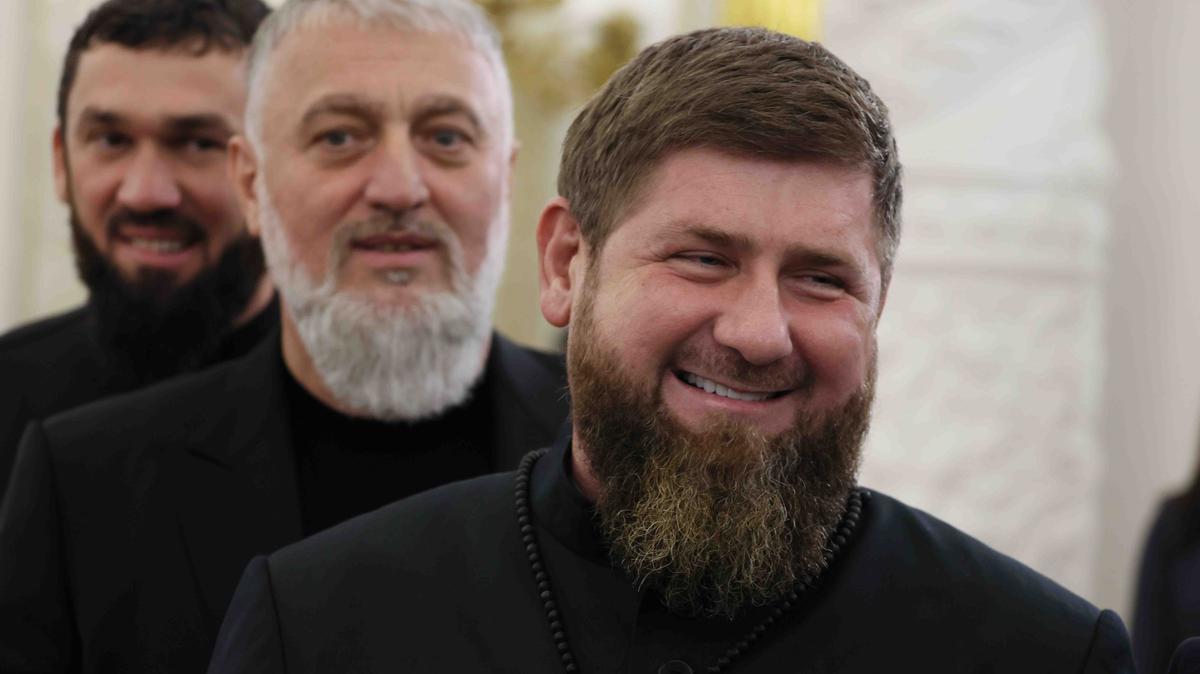Speculation concerning Chechen leader Ramzan Kadyrov’s health began circulating in social media late last year and was chiefly propagated by a network of Chechen Telegram channels connected and moderated by the same group of people. Until recently, only Ukrainian bloggers paid attention to these rumours. However, in late February and early March, Kadyrov’s health suddenly became a buzz topic.
On 21 February, Kadyrov was absent from Vladimir Putin’s annual address to the nation. On 3 March, Putin unexpectedly met Kadyrov’s oldest son, 17-year-old Akhmad, who was accompanied not by his father, but by Ruslan Edelgeriyev, the president’s climate advisor.
From the remarks of Ramzan Kadyrov, who for some reason stayed in Chechnya that day, his son’s meeting with Putin seems to have been a kind of wedding present (Akhmad Kadyrov got married the next day). However, the meeting itself mainly centred on the historical role of Akhmad’s grandfather and namesake, the former chief mufti of independent Ichkeria who later offered his service to Russia, Akhmad-Khadji Kadyrov. The mention of Akhmad-Khadji in this context led many to draw a direct association with another meeting of Putin’s: in 2004, after the assassination of his father, the young Ramzan visited the Kremlin. The tracksuit in which he arrived for his meeting with the president became forever etched in Russia’s historical memory. It was then that Kadyrov’s political career began.
This article was originally published on the website of Novaya Gazeta. We thank our colleagues for the opportunity to publish its translation.
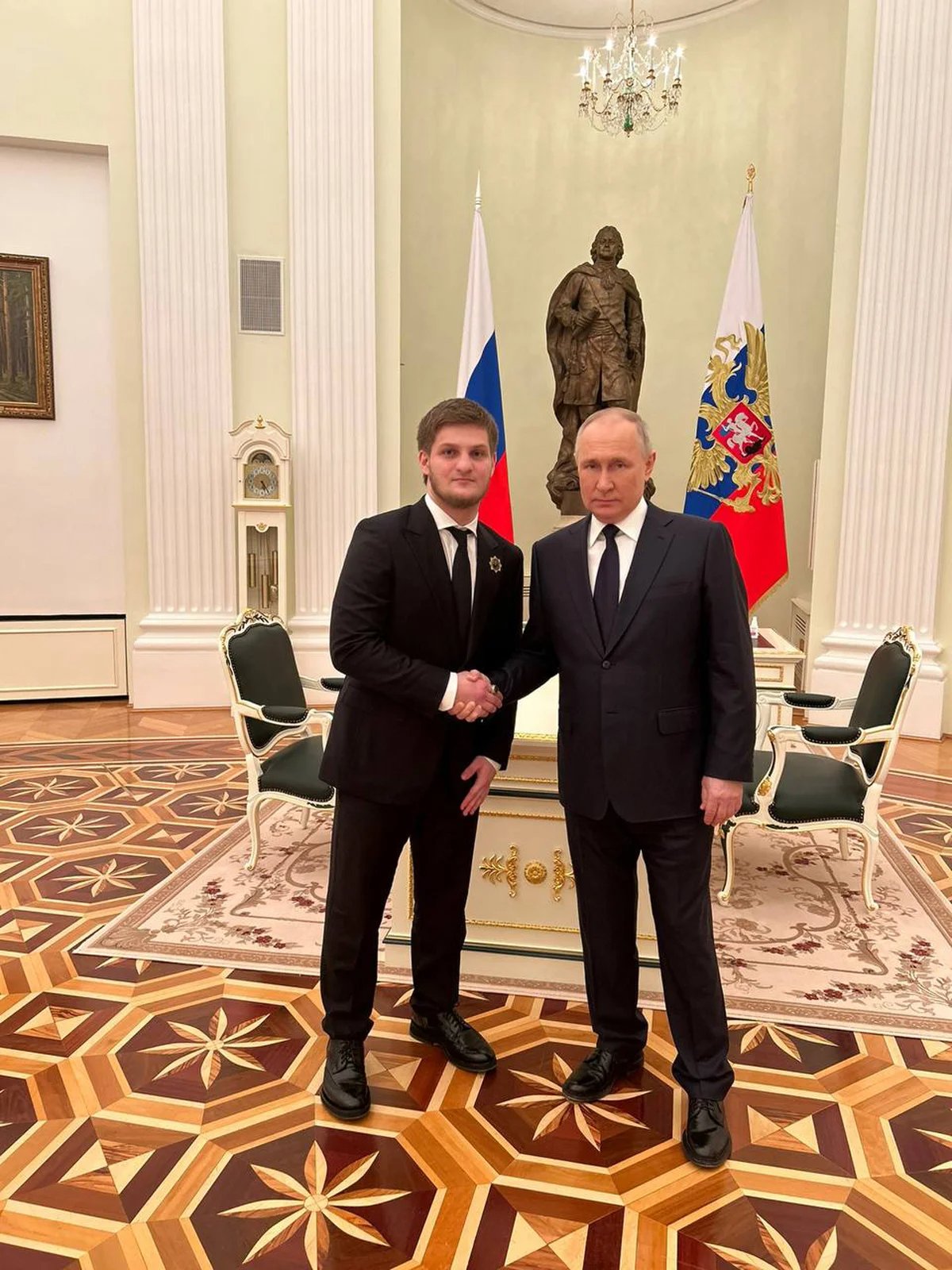
Ramzan Kadyrov’s son Akhmad meets Vladimir Putin, 3 March 2023. Photo: Ramzan Kadyrov’s Telegram channel
Are we witnessing the decline of this era and the transfer of power to a successor son? This is the question many were asking in March 2023. An anonymous article in the German tabloid Bild fuelled the discussion by suggesting that Kadyrov allegedly had kidney problems and that a nephrologist from Abu Dhabi had been flown to the Chechen capital of Grozny because Kadyrov supposedly does not trust Russian doctors. Based on this, conspiracy bloggers insinuated that Kadyrov might have been poisoned by Russian secret services. Professional media picked up the story, and did so in such unison that on 13 March, Ramzan Kadyrov had to fly to Moscow for a meeting with Vladimir Putin.
After this visit, Kadyrov finally commented for the first time on the rumours about his health: “To those who are entertaining themselves with the hope that I am incurably ill: I’m sorry to disappoint you.”
Incidentally, the poisoning theory is far more reasonable than the speculations about a visit from some Abu Dhabi doctor and the Bild’s nonsensical conclusion about Kadyrov’s possible distrust of Russian medicine.
Special operations involving chemical warfare agents, about which we have learned a great deal since the assassination attempt on Alexey Navalny, have been practised in Chechnya since at least the late 1990s.
It is safe to say that in many ways it was during the elimination of Chechen guerrillas that the state’s poisoners first mastered their trade.
A former employee of the regional department of internal affairs from the time of General Arkady Yedelev, who played an enormous role in the Northern Caucasus in his day, told me that members of a Chechen jamaat were eliminated in exactly the same way as Navalny was poisoned a decade later: a Russian military uniform treated with poison had been passed through a secret service agent to the guerrillas. Almost the entire jamaat was killed, including the agent himself.
Two months after the poisoning team treated Navalny’s underwear with Novichok, three of its members also visited Chechnya. They stayed in Grozny from 1 to 5 November 2020 (the team investigating Navalny’s attempted assassination published their geolocation data and movement details). The purpose of their visit to the republic remains unclear.
None of this, however, has anything to do with Kadyrov, because he is neither a Chechen rebel, nor a defector from the FSB, nor an opposition politician. That is, he is not an enemy, not a traitor, and certainly not Putin’s political rival. Kadyrov is a politician who has been fully incorporated into the Russian system. And his potential falling out of the system, especially at such a difficult time, is, while not fatal, nonetheless very problematic for the Kremlin.
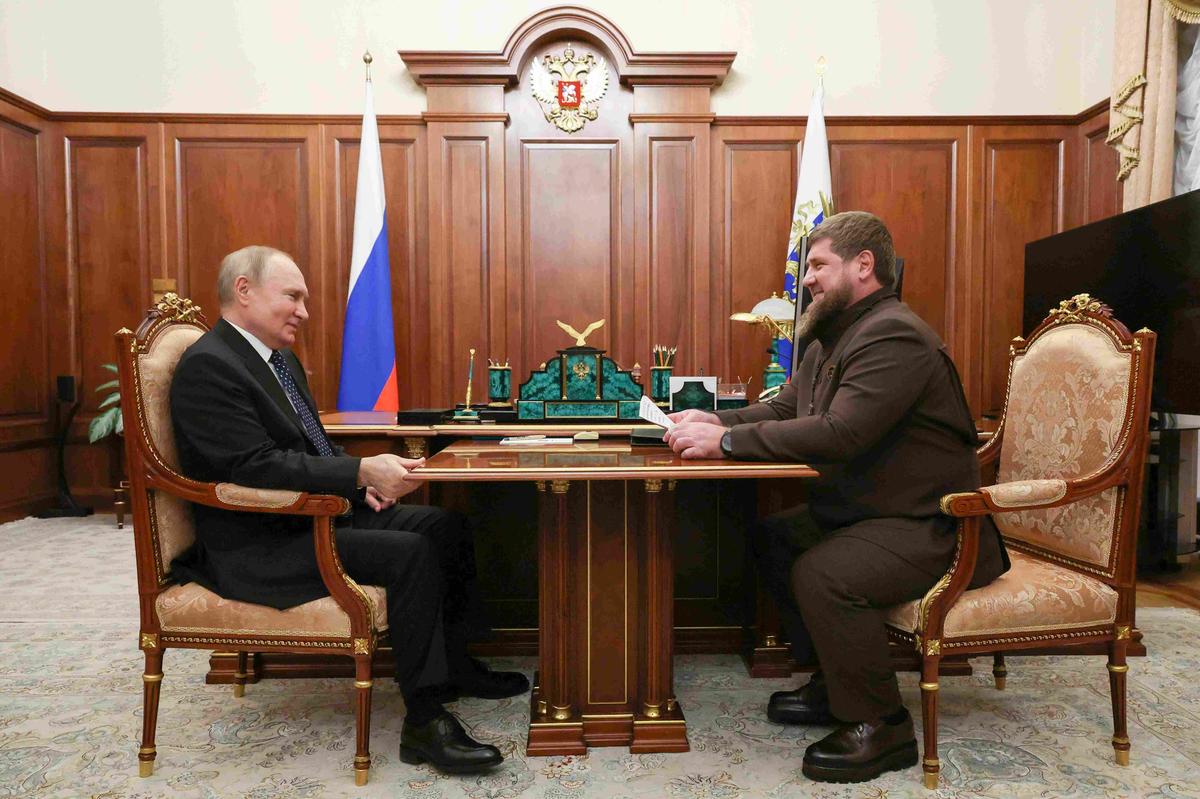
Russian President Vladimir Putin and Chechen President Ramzan Kadyrov during a meeting in the Kremlin on March 13, 2023. Photo: EPA-EFE / MIKHAEL KLIMENTYEV / SPUTNIK / KREMLIN / POOL MANDATORY CREDIT
Some years ago, Novaya Gazeta’s sources in Kadyrov’s inner circle began mentioning an allegedly serious illness that was difficult to treat and had a mortality rate of 30%. For several years, Kadyrov’s state of health gave no apparent cause for concern, in spite of noticeable and frequent weight fluctuations. Kadyrov underwent check-ups twice a year, as is standard for a Russian class A official — in the presidential administration hospital in Moscow, during vacation. At times, his leave dragged on for up to forty days, and in several instances, he was seen at work meetings with an intravenous infusion catheter on his arm.
Our sources claim, however, that there have been serious changes since last June.
The disease is life-threatening because it can lead to the failure of other organs, especially the kidneys and lungs (hence the severe shortness of breath). It is accompanied by excruciating bouts of pain that prevent one from sleeping. Even strong painkillers that are usually prescribed for terminal cancer patients do not help.
…Within just six months, the outward signs of Kadyrov’s condition have become more apparent: he has noticeably reduced his usually high level of activity, although his social media accounts have been hustling and bustling.
But the clearest sign of his likely ill health has been the sudden and active involvement of Kadyrov’s underage sons in running the republic.
Last June, Chechen state TV began regularly showing three bored Chechen teenagers: 16-year-old Akhmad, 15-year-old Adam, and 14-year-old Zelimkhan Kadyrov. They now attended many hours of meetings with their father, accompanied him on administrative trips around the republic, and met with federal politicians and officials who have been frequenting the region since the start of the military operation in Ukraine.
With the apparent aim of increasing public awareness of the junior Kadyrovs, they were sent on a military tour to the war zone in Ukraine. While the boys were being filmed in the “frontline trenches” with guns in their hands and Ukrainian POWs being presented to them, Ramzan’s eldest daughter Aishat distributed humanitarian aid to residents of the “people’s republics” of Donetsk and Luhansk.
At first, the young Kadyrovs were accompanied and cared for by their long-time mentor and coach, the well-known Russian boxer and MMA fighter Abdul-Kerim Edilov. Last February, the grateful Ramzan Kadyrov appointed his children’s tutor to the post of Chechen Deputy Prime Minister in charge of sports and youth policy.
But Edilov did not hold that position for long. In September, he was abruptly cut off from Kadyrov’s children, and in November he was dismissed from the Chechen government “at his own request” (at the same time, Edilov’s brother Walid was fired from his position as Sports Minister). Both Chechen bloggers and professional media speculated that this fall from grace might have something to do with drugs and a deadly car accident. Novaya’s sources have confirmed all the details of that truly scandalous story. And in December came the news of the 32-year-old athlete’s sudden death.
But Chechen bloggers are wrong to blame Ramzan Kadyrov for his death: Edilov had an acute conflict with Khamzat Kadyrov, Ramzan’s nephew.
It turns out that Edilov had been friends with the same young women that Khamzat himself had been in close contact with before. Abdul-Kerim was interested in the compromising information that these women had on Ramzan’s nephew. Khamzat found out about this, and Edilov, who by that time had already lost all protection from the head of Chechnya, was taken to a police station for further investigation…
They say that when Ramzan Kadyrov learned of Edilov’s death he became enraged, but in the end, he settled the matter in accordance with Chechen law. Things were reconciled with the family, and Abdul-Kerim’s brother, Walid Edilov, was taken back into the inner circle and appointed to a high position in Kadyrov’s administration.
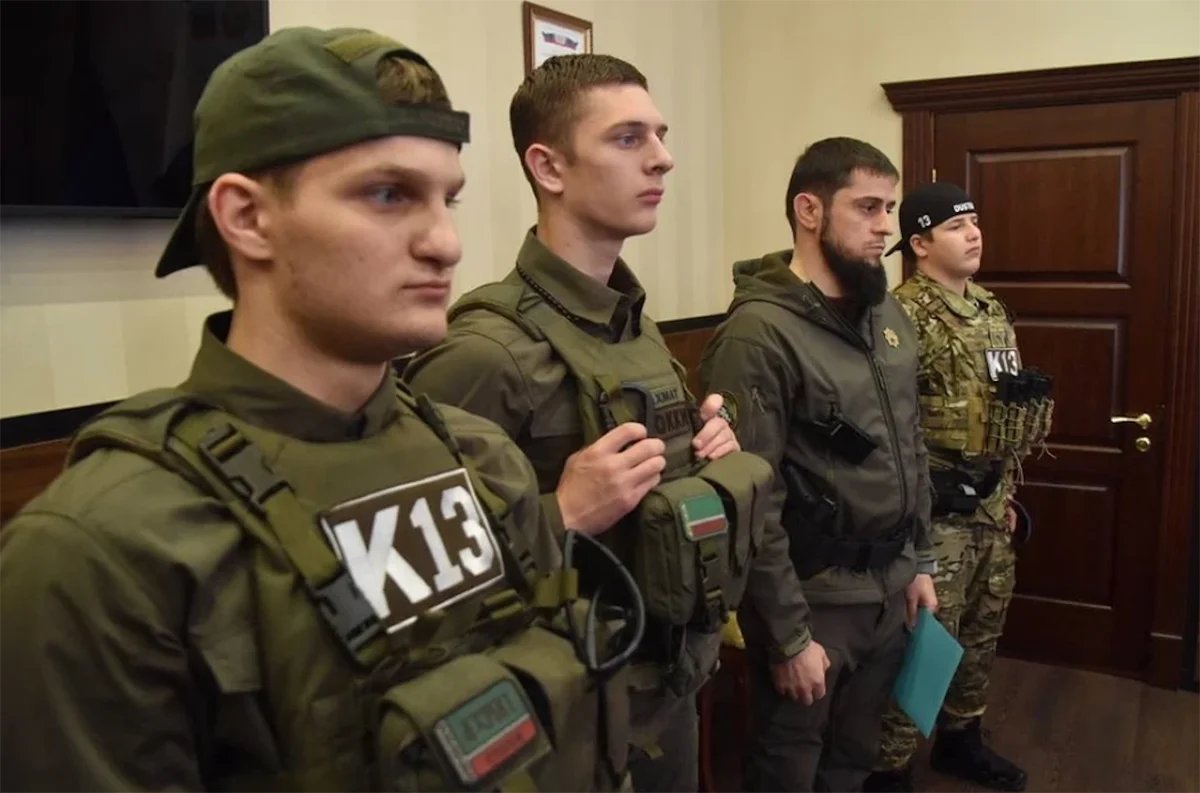
Kadyrov’s sons in Donetsk. Photo: “DPR” head Denis Pushilin’s Telegram channel
Meanwhile, Kadyrov’s sons, or rather the eldest, Akhmad, were assigned a new mentor — Ruslan Edelgeriyev, climate advisor to the Russian president.
Ruslan Edelgeriyev (known in Chechnya by his Chechen second name Abubakar) became Putin’s advisor in 2018, after having headed the Chechen government for six years. He owes his promotion both in Chechnya and in Moscow entirely to Ramzan Kadyrov and acts as his ambassador.
Last September, highschooler Akhmad Kadyrov was appointed assistant to the head of Chechnya, and then declared chairman of the Chechen branch of Putin’s brainchild “Movement of the First” — a patriotic youth organisation that had not even been established at the time.
Since last autumn, Edelgeriyev has been visiting Chechnya more and more frequently, taking part in many meetings between the head of Chechnya and federal politicians.
During such meetings, Edelgeriyev accompanies Akhmad Kadyrov, giving him instructions and smoothing over awkward moments (whether because of his shyness or poor articulation skills, Kadyrov’s son expresses his thoughts in Russian rather clumsily).
Moreover, it is Edelgeriyev who takes Akhmad to Moscow and attends meetings with him at the level of federal ministers and their deputies.
In truth, there was nothing unexpected in the meeting that Vladimir Putin held with Ruslan Edelgeriyev and Akhmad Kadyrov on March 3. It is the result of the persistent, rapid, and virtually undisguised political promotion of Kadyrov’s heir. But while the reason for this development is clear, the end effect is not.
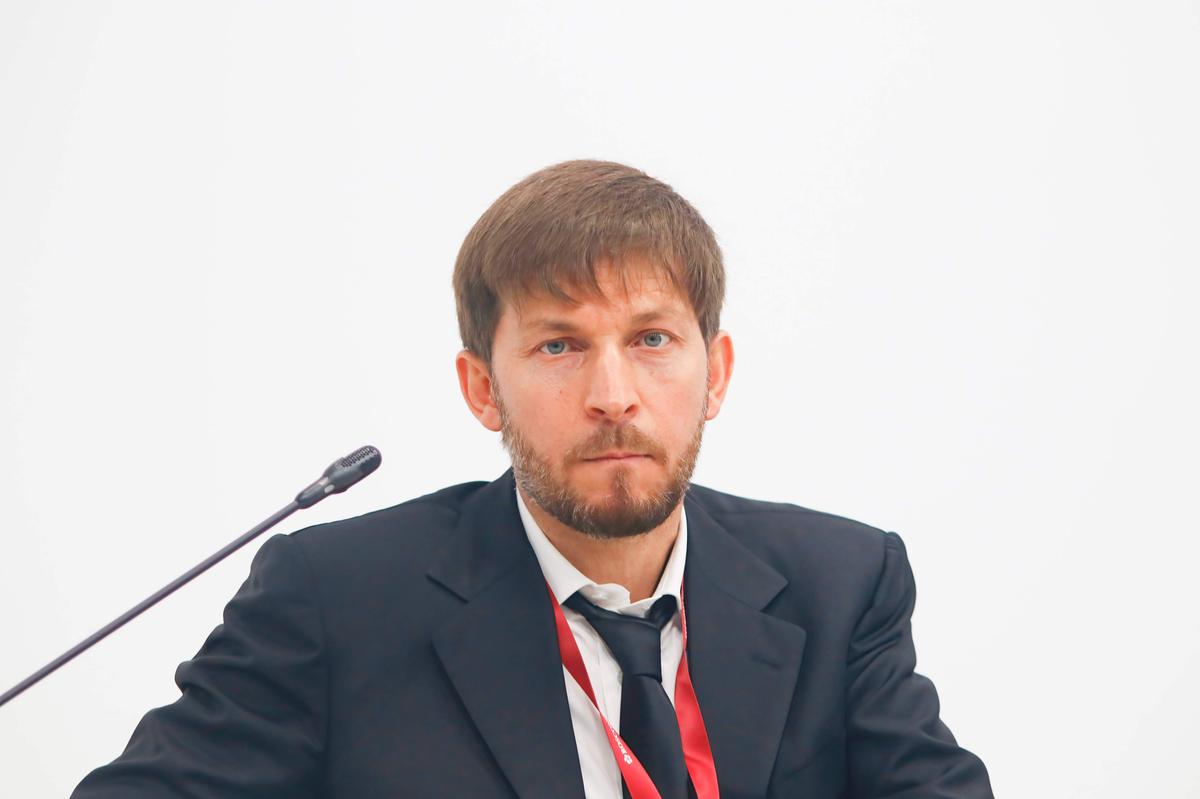
Ruslan Edelgeriyev. Photo: Maksim Konstantinov / SOPA Images / LightRocket / Getty Images
The head of Chechnya is not naive enough to actually believe that his son is capable of:
- taking over Chechnya
- keeping that power in his hands for the foreseeable future.
Firstly, his young age (and thus the law) will not allow him to do so. Secondly, it is very doubtful that, should there occur a forced change of power in Chechnya, Moscow would again reproduce Russia’s unique “state within a state” model of governance in the region.
For this reason,
the only sensible explanation for Kadyrov’s head-on promotion of his children to the highest level of government is a desire to protect them. It is a clear demonstration for all those concerned that the inviolability of the family shall be guaranteed even in the worst-case scenario.
So, what awaits the Chechen Republic without Ramzan Kadyrov?
It seems to me that those who still dream of an independent Chechnya will have to come to terms with the fact that Ichkeria has irrevocably perished, having become a beautiful dream, but one that has little chance of reality and is therefore unobtainable. There is no political potential for protest either in Chechnya itself, or in the Chechen diasporas around the world.
As for who can take the spot of Chechnya’s governor, I find that one should first consider not potential candidates, but the systemic issues that need to be solved for Chechnya to return to nationwide standards.
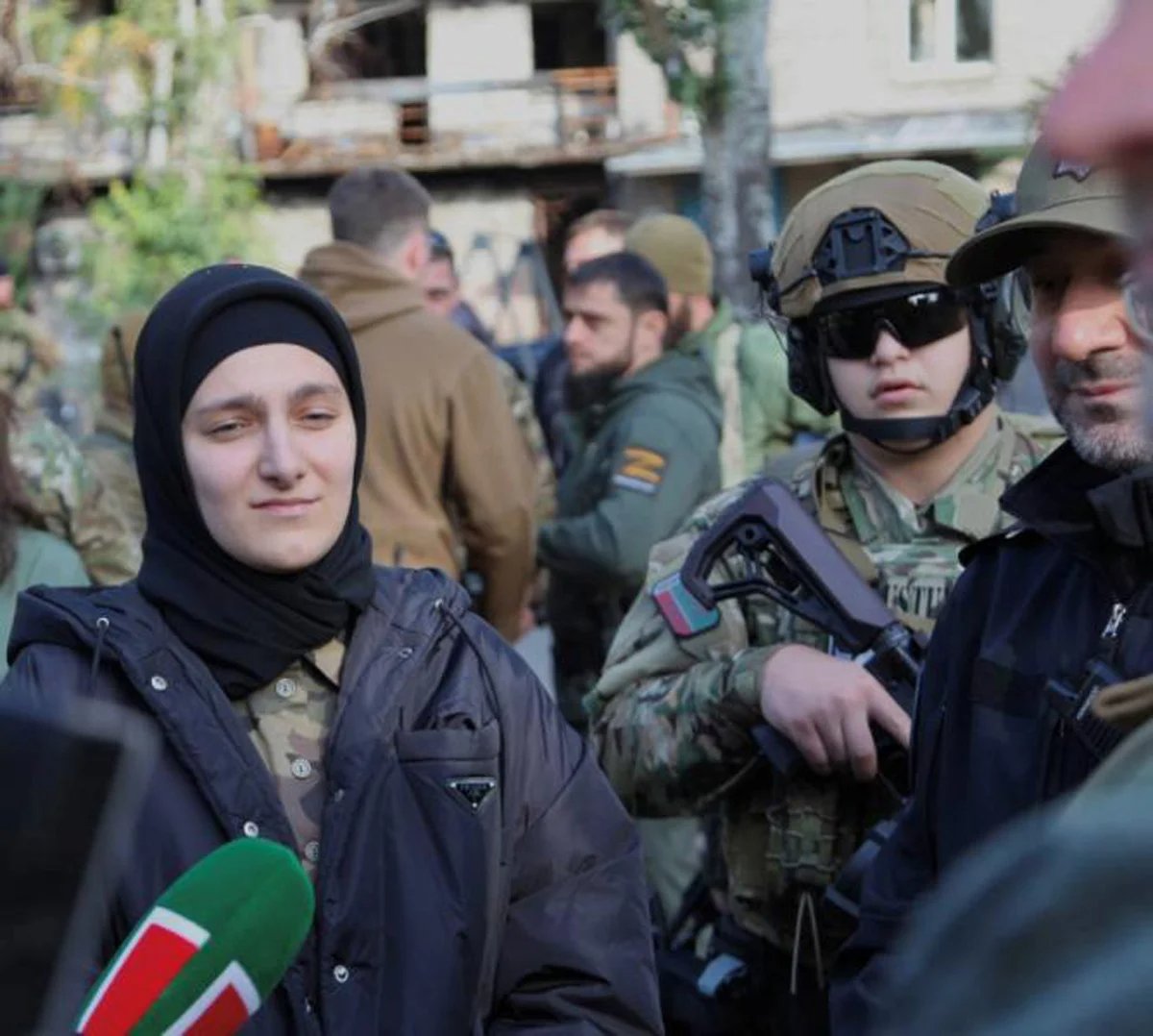
Aishat Kadyrova in Mariupol. Photo: Grozny-Inform News Agency
And the first of these problems is the absence of any control over how federal budget funds are spent.
The budget sector accounts for more than 40% of the republic’s GDP, and over a third of its economically active population is employed in this sector. That is, the process of extracting and distributing the federal budget and extra-budgetary state funds is the driver of the Chechen economy.
But they are distributed in such a way that the Russian budget, poetically compared by Ramzan Kadyrov to Allah, has become the main source of the Chechen leader’s capabilities that seem incredible to other Russian governors.
Although he tries, Kadyrov cannot abstain from rubbing his wealth in the face of the envious world. For example, he took great pains to prevent anyone from finding out how much his son’s wedding cost — but he could not resist boasting about the price of his horse, Zazu, which he said cost “at least ten million dollars” and had been stolen from him in the Czech Republic.
But you will not find any mention of Zazu in Kadyrov’s tax statements. Until 2018, these did not correspond at all to his lifestyle (which is that of a very wealthy man).
It was not until 2019 that Ramzan’s declared income suddenly spiked (it jumped from 7.5 mln rubles (€89,000) in 2018 to nearly 143 mln rubles (€1.7 mln) in 2019 and 381 mln rubles (€4.5 mln) in 2020), and then dropped just as dramatically (to 26.5 mln rubles, or €315,000, in 2021). The tax statements do not specify the source of his income, but they make it clear that during his years in power Kadyrov has acquired very few new assets. With one very telling exception: the statement for 2018 lists a plot of land adjacent to Kadyrov’s residence in the centre of Grozny. This land was originally included in the residence’s development plan as a park area. But until 2018, the park was formally owned by the Chechen company Grozny City LLC.
This is a prime example of how the Chechen economy really works. Chechen assets, ranging from the land on which the houses of Kadyrov and his closest associates are built to the republic’s real estate development sector, cellular communications, car sales, the agricultural business, restaurant chains, rubbish collection and recycling, transport infrastructure, much of Chechen oil and many other things are, on paper, owned or operated by a fairly narrow circle of Chechen businessmen and managers that receive huge state contracts.
Their names (for example, the Alviyev brothers Movsadi, Khalid and Khozhbaudi; Yusup Gudayev, Bay-Eli Edilgireev, and others) are unknown to the general public, although formally, on paper they are respected Chechen businessmen and managers. But they are not visible anywhere.
We were hard put to find a single image of Movsadi (known in Chechnya as Movladi) Alviyev, who is known as the principal real estate developer in Chechnya and elsewhere (the firm also has assets in other Russian regions). His company, Grozny City LLC, manages and leases out all Chechnya’s skyscrapers, and does much else besides; investigations into the assets of Grozny City LLC have been published repeatedly and are easily accessible online.
The brothers Movsadi and Khozhbaudi are from Tsentoroy, the ancestral village of the Kadyrovs, and were friends of Ramzan Kadyrov’s father. Khozhbaudi has always had a connection with Chechen oil and is said to have even employed the older Kadyrov during the hard times of the Chechen war. From 2007, when Putin appointed Ramzan president of Chechnya, to 2018, Khozhbaudi Alviyev was head of the oil company Chechenneftekhimprom, and together with Kadyrov battled against oligarch Igor Sechin and his oil giant Rosneft, lobbying for the return of Chechenneftekhimprom into republican ownership (in 2018, Putin issued a decree transferring 100% of Chechenneftekhimprom from federal to Chechen ownership).
It was the Alviyev brothers (authors of the concept of the Kadyrov Foundation, one of the shadiest NGOs in Russia) who, among a small circle of Ramzan Kadyrov’s close acquaintances and fellow villagers, became his co-investors and eventually, quite possibly, the formal, unknown owners or managers of a large number of Chechen businesses with which Ramzan Kadyrov is publicly associated.
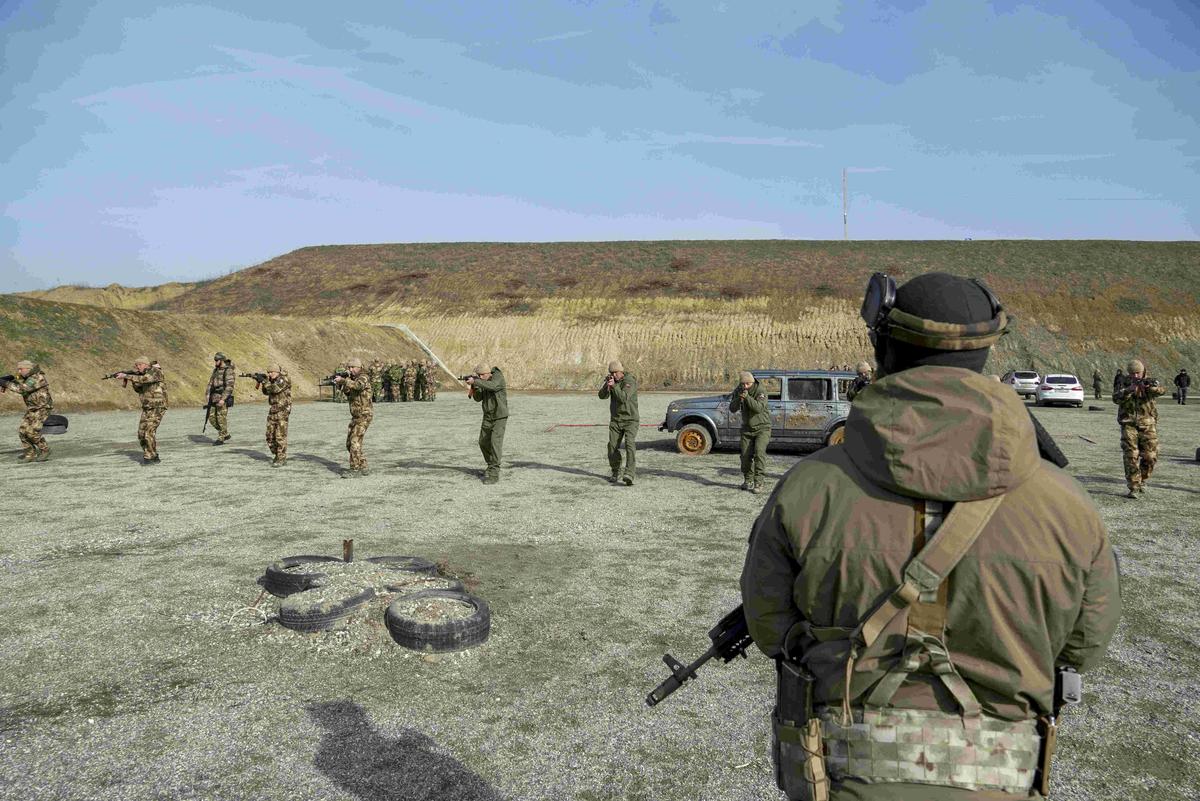
Russian Special Forces University in Gudermes. Photo: Vladimir Aleksandrov / Anadolu Agency / Getty Images
A perfect example is the now world-famous Russian Special Forces University (RUS) in Gudermes. The land on which the university is built is leased to the business structures of Movsadi Alviyev, who is also CEO of the Master sports and training centre. The official owner of the centre is former FSB special forces officer Alexei Chudan, and he is also the director of RUS, which is registered as a “sporting and shooting club”. A scheme in which a poor FSB officer owns a firm, while its director is among the wealthiest — and closest to Kadyrov — businessmen in Chechnya, is typical of the republic, and hints rather transparently at the true beneficiary of this brilliant business idea.
Over the past year, the Special Forces University has become Chechnya’s signature landmark, a source of great personal pride for Kadyrov, and a symbol of how radically the image of the Chechens has changed in Russia. Who now dares to call them terrorists?
But let us imagine: Kadyrov is gone. What will happen to these and other “unofficial” assets? Will they be taken over by the new ruler of Chechnya? Just like that?
Moving on. Large opaque financial flows in Chechnya pass through three very trivial institutions: the Russian Pension Fund, the Social Security Fund and the regional Medical Insurance Fund. All of these are run by people who are obviously loyal to Kadyrov, appointed at the beginning of his rule, whom he has protected and has never replaced under any circumstances. Why? Probably because they know all the schemes and everyone in Moscow who has a vested interest in these schemes.
Now let us imagine that Kadyrov is gone. Will these people stay in their places?
There is one more extremely important source of extra-budgetary funding for the current government, and it is linked directly to the “President Hotel” in Moscow.
It is there that the Moscow base of Chechnya’s representative in the Russian Duma, Adam Delimkhanov, is located, and it is there that a whole team of excellent Moscow and Chechen lawyers make decisions that are extremely painful for Russian (and not only Russian) businessmen.
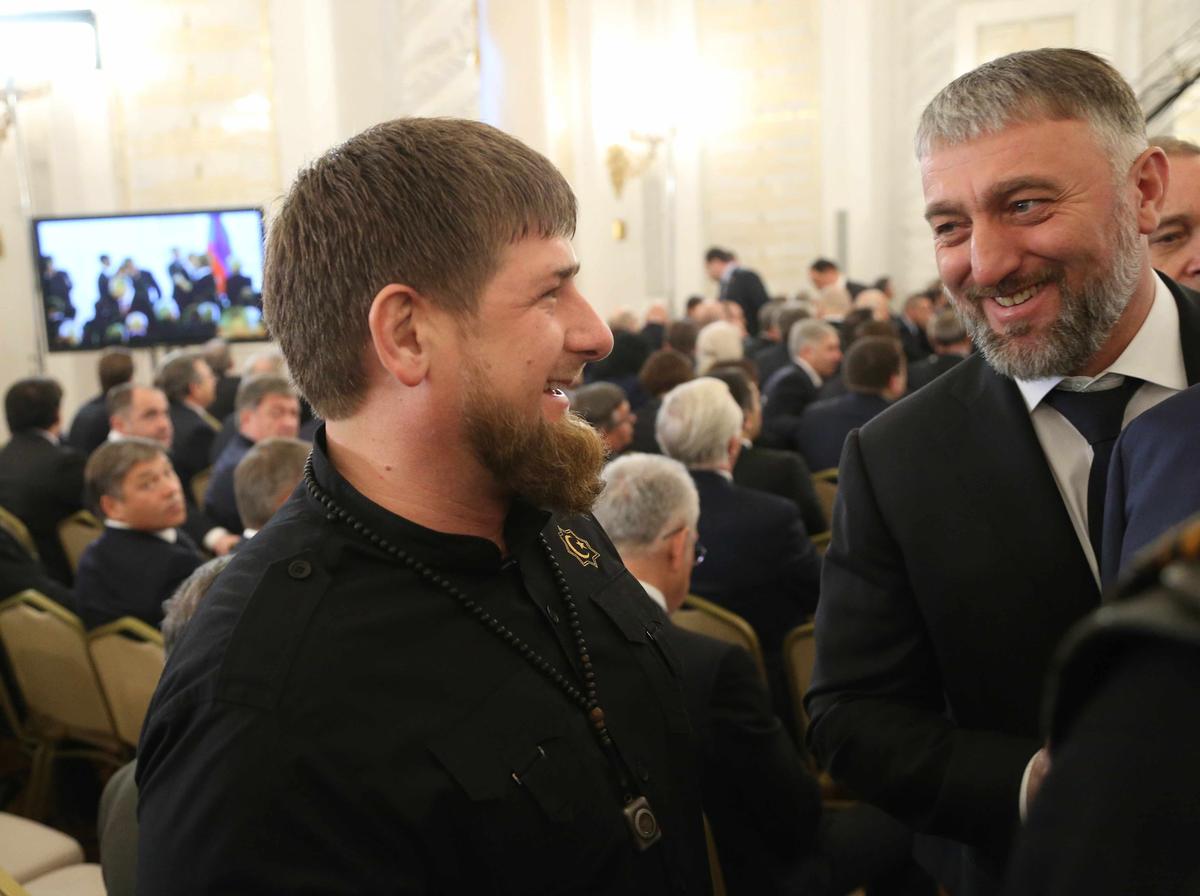
Deputy Prime Minister of the Chechen Republic and Russian Duma member Adam Delimkhanov with the head of the Chechen Republic Ramzan Kadyrov. Photo: Sasha Mordovets / Getty Images
And now let us imagine: Kadyrov is gone. Where and, most importantly, how soon will Adam Delimkhanov end up, in spite of all his state honours and golden pistols that tend to fall out of his pockets in Dubai as well as in the halls of the State Duma?
This, incidentally, is another crucial systemic issue that the Kremlin will have to solve should a change of power occur in Chechnya. It has to do not so much with the money, but with the fundamental principle of Kadyrov’s rule, which, as it turns out, has had not only its drawbacks, but also some advantages.
Kadyrov has always ruled over the Chechens as their sole master. Only he could punish or pardon them, protect Chechen raiders and assassins throughout Russia as well as Muslim holy scriptures that Russian courts have declared extremist. Only Kadyrov had the right to send Chechens to war or cancel the mobilisation in Chechnya.
In fact, this is exactly what led to his conflict with the Russian Ministry of Defence last year: Kadyrov simply refused to allow Chechens to be used in the war against Ukraine in the same way that, as shown in numerous videos, mobilised people from all over Russia are being used.
Have you noticed? The Chechens are the only ones who have not once complained about being thrown into deadly and senseless attacks or asked for help from their formidable Padishah.
And now let us imagine: Kadyrov is gone. How quickly will Chechen men be sent to the Ukrainian frontline? And will Chechnya’s new governor be able to do what Kadyrov has done for all these years — play the enraged bull that nobody dares fool around with?
Join us in rebuilding Novaya Gazeta Europe
The Russian government has banned independent media. We were forced to leave our country in order to keep doing our job, telling our readers about what is going on Russia, Ukraine and Europe.
We will continue fighting against warfare and dictatorship. We believe that freedom of speech is the most efficient antidote against tyranny. Support us financially to help us fight for peace and freedom.
By clicking the Support button, you agree to the processing of your personal data.
To cancel a regular donation, please write to [email protected]
